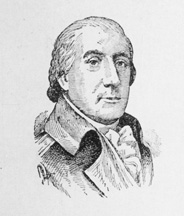Alexander Martin
Alexander Martin (* 1740 in Hunterdon County , Province of New Jersey , † November 10, 1807 in Stokes County , North Carolina ) was the governor of North Carolina from 1782 to 1784 and from 1789 to 1792. He belonged to the party of the Federalists and is considered one of the founding fathers of the United States .
Early years and political advancement
Alexander Martin first attended the local schools in his home country, then Newark College and later Princeton University . Around 1761 he came to North Carolina in Guilford County . He studied law and after graduating, began a legal career in Salisbury. In the colonial era he was a public prosecutor, justice of the peace and regular judge in his district. Between 1773 and 1774 he was a member of the North Carolina colonial parliament . Martin then joined the American Revolution and in 1775 became a delegate to a congress preparing the independence of North Carolina. In the war that followed against the British, he became a colonel. He led his unit into the battles of Brandywine and Germantown . His conduct during the Battle of Germantown earned him a court martial for cowardice. However, he was acquitted of all allegations. He then left the army and returned to North Carolina politics. Between 1778 and 1782 he was in the Senate of that country .
First consecutive term as governor of North Carolina
In 1781, Martin was Speaker (President) of the North Carolina Senate. When Governor Thomas Burke fell into British captivity in September 1781 and was imprisoned for four months, Martin temporarily took over the office of governor until Burke's return in January 1782. In April 1782 he was then regularly elected governor by parliament. In the following two years he was re-elected, which gave him three consecutive terms of office. The constitution of the time did not allow more. Overall he was from April 22, 1782 to May 13, 1785 governor of North Carolina. During this time the war with the British ended and American independence was recognized. The urgent task now was to build an orderly administration. At the same time there was conflict in the west of the country with the separatist provinces, which had declared themselves independent under the name "State of Franklin". They had chosen the later first governor of Tennessee John Sevier to be their head of state and were aiming for admission as an independent state to the USA.
The time between terms as governor
At the end of his first consecutive term, he returned to serve as President of the North Carolina Senate. In 1787 he was a delegate to the Constituent Assembly of the United States (Constitutional Convention).
Second consecutive term as North Carolina Governor
In 1789 he was re-elected governor of his country. His term began on December 17, 1789 and ended after two re-elections on December 14, 1792. He put an emphasis on education policy and supported the establishment of the University of North Carolina. The western parts of the country were finally given up. There President George Washington established the so-called Southern Territory, from which the State of Tennessee later emerged.
Further career and death
At the end of his second consecutive term, Martin was named a US Senator by his country's House of Representatives. This process lasted until 1913 when a US constitutional amendment mandated direct election of senators. Martin remained in the US Senate until 1799. In 1799, the North Carolina Parliament denied him another term in the US Congress. In 1804 he was re-elected to the Senate of his home state. He was also a curator at the University of North Carolina for the last seventeen years of his life. In terms of party politics, Martin belonged to the federalists until around 1790, but then switched to the National Republicans. He died in November 1807 on his Danbury plantation.
literature
- Robert Sobel and John Raimo (Eds.): Biographical Directory of the Governors of the United States, 1789–1978. Volume 2, Meckler Books, Westport, Conn. 1978, 4 volumes, ISBN 0-930466-00-4
Web links
- Alexander Martin in the Biographical Directory of the United States Congress (English)
- Alexander Martin in the National Governor Association (English)
- American Founding Fathers (English)
- Alexander Martin in the database of Find a Grave (English)
| personal data | |
|---|---|
| SURNAME | Martin, Alexander |
| BRIEF DESCRIPTION | American politician, governor of North Carolina, one of the founding fathers of the United States |
| DATE OF BIRTH | 1740 |
| PLACE OF BIRTH | Hunterdon County , New Jersey |
| DATE OF DEATH | November 10, 1807 |
| Place of death | Stokes County , North Carolina |


